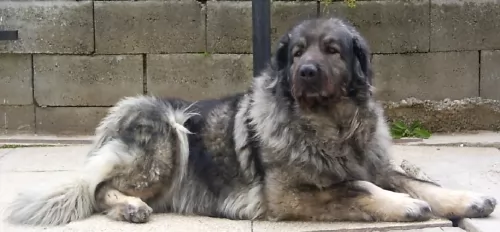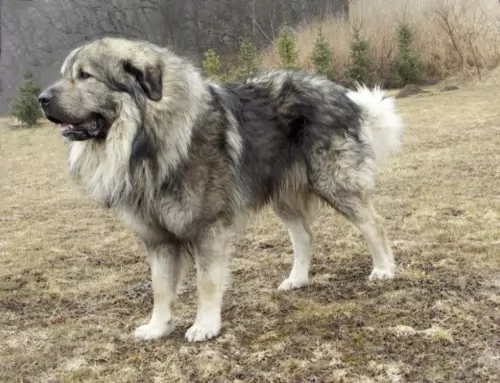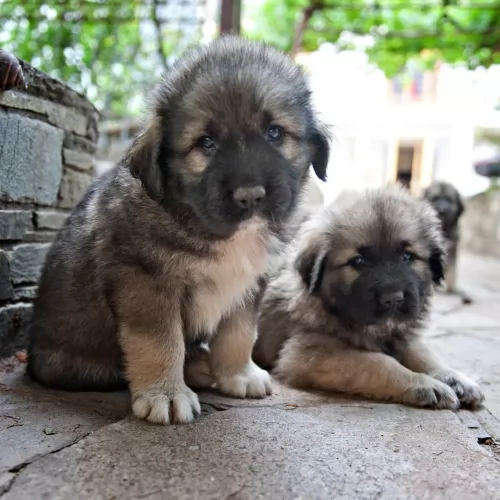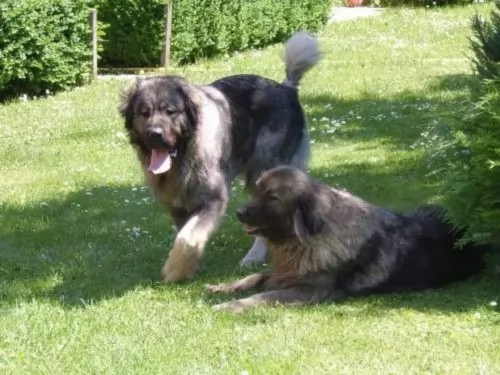 Petzlover
Petzlover Field Spaniel is originated from United Kingdom but Sarplaninac is originated from Macedonia. Field Spaniel may grow 16 cm / 6 inches shorter than Sarplaninac. Field Spaniel may weigh 20 kg / 44 pounds lesser than Sarplaninac. Both Field Spaniel and Sarplaninac has same life span. Both Field Spaniel and Sarplaninac has almost same litter size. Both Field Spaniel and Sarplaninac requires Moderate Maintenance.
Field Spaniel is originated from United Kingdom but Sarplaninac is originated from Macedonia. Field Spaniel may grow 16 cm / 6 inches shorter than Sarplaninac. Field Spaniel may weigh 20 kg / 44 pounds lesser than Sarplaninac. Both Field Spaniel and Sarplaninac has same life span. Both Field Spaniel and Sarplaninac has almost same litter size. Both Field Spaniel and Sarplaninac requires Moderate Maintenance.
 The Field Spaniel was developed to retrieve game, being developed in 19th century England as a hunting companion. Today they are still used as hunting dogs but he is essentially a family companion and show dog.
The Field Spaniel was developed to retrieve game, being developed in 19th century England as a hunting companion. Today they are still used as hunting dogs but he is essentially a family companion and show dog.
He was developed to be a medium-sized, all-black dog. Until 1901, spaniels were divided by weight, with the Field Spaniel being the bigger dog.With developing the breed, the Basset Hound was introduced and then English Springer Spaniels were also brought into the mix.
Today the Field Spaniel is still a rare breed even in the UK. To promote the breed, the dog has been registered as a Vulnerable Native Breed by the Kennel Club.
 Hailing from Macedonia, the beautiful Sarplaninac dog was developed as a guardian of livestock and is large enough to fight off large predators like bears and wolves.
Hailing from Macedonia, the beautiful Sarplaninac dog was developed as a guardian of livestock and is large enough to fight off large predators like bears and wolves.
Nobody is too sure of the breeds exact origins, though it is thought that its ancestors came to the Balkan Peninsula with people migrating from ancient Asia.
This huge dog is one of the oldest native breeds from ancient Molosser breeds. The dog was recognized in 1939, and in 1954 it became known as the Yugoslav Shepherd Dog. Later the name changed and the dog was recognized by the United Kennel Club in 1995.
 The Field Spaniel is a medium sized dog, standing at 43–46cm in height and weighing between 18–25kg. The single coat of the Field Spaniel is fairly long with the traditional feathering at the legs, belly, chest and tail.
The Field Spaniel is a medium sized dog, standing at 43–46cm in height and weighing between 18–25kg. The single coat of the Field Spaniel is fairly long with the traditional feathering at the legs, belly, chest and tail.
The coat comes in solid colours of black, liver or roan. You might also find some ticked markings of white. The tail of the Field Spaniel is traditionally docked with the ears being long and floppy.
Happy, busy and active, the Field Spaniel makes an excellent family pet. They get on well with children and with other pets in the home. It is the kind of dog, that while friendly with all members of his human family, he forms a strong bond with one member whom he regards as special.
Bright and intelligent, he is also a dog that does well when socialized and trained, being more docile and less excitable than Cocker spaniels. The Field Spaniel is a dog who thrives on being busy and won’t relish lying around with nothing to do. He loves water and where there is a dam or pond, he’ll be there and want you to join him.
 The Sarplaninac is a large, strong, fluffy dog standing at between 54 and 62cm in height and weighing between 30 and 45kg.
The Sarplaninac is a large, strong, fluffy dog standing at between 54 and 62cm in height and weighing between 30 and 45kg.
The coat of the dog is dense, coarse and of medium length. Colors are different shades of grey, white, tan and black. The head is large, the ears are fairly short but are floppy and covered with short hair. The dog is deep chested and the tail is long, often held high and covered with thick, feathery hair.
Protective, reliable, reserved, stubborn and gentle, this intelligent dog is fairly serious, and while he makes a devoted family pet, he is cool and wary of strangers.
Excellent training and socialization makes him well mannered, balanced and obedient around different people. He will tolerate children but won’t take easily to other pets in the house, capable of becoming aggressive with them.
 Once people have owned any of the Spaniel breeds, they discover what a wonderful friend the dog is. He is loyal, loving, protective, brave, confident, fun-loving and smart. He isn’t aggressive but he may not like a stranger to reach out and pat him.
Once people have owned any of the Spaniel breeds, they discover what a wonderful friend the dog is. He is loyal, loving, protective, brave, confident, fun-loving and smart. He isn’t aggressive but he may not like a stranger to reach out and pat him.
The Field Spaniel is a wonderful dog and he will adapt to life in the city or in the countryside, just so long as he has his beloved human family close by.
 These dogs are protective, but they’re not vicious. When properly raised they are wonderful family pets.
These dogs are protective, but they’re not vicious. When properly raised they are wonderful family pets.
True, it’s a large, strong willed dog that isn’t a good choice for the first-time dog owner. They are good with children, but only children who have been taught how to treat animals with care and patience.
This dog is a powerful guardian type of dog, imposing in size, but it’s all about upbringing, and if you bring him up well then he can make a tremendous pet and companion.
 The Field Spaniel is a robust dog breed and can live to be 12 – 14 years of age. Apart from watching for ear infections with his long ears, there are some common dog illnesses that are worth knowing about -
The Field Spaniel is a robust dog breed and can live to be 12 – 14 years of age. Apart from watching for ear infections with his long ears, there are some common dog illnesses that are worth knowing about -
Most older dogs have hardening of the lens and this is when the lens turns a whitish or greyish colour. However if your dog has cloudy eyes, it doesn’t simply mean he can’t see well as he often can. Once a lens has a cataract, some people try nutritional support of the lens which can work to lessen the severity of developing cataracts.
Surgery can help but a veterinary ophthalmologist can determine if cataract surgery is needed as most times it isn’t. If you can’t afford surgery, it is still important to have your dog evaluated by a veterinary ophthalmologist so that you avoid further complications with your pet’s eyes.
Progressive Retinal Atrophy is another eye disease, a degenerative disease that affects the photo-receptor cells where they deteriorate over time and can eventually lead to blindness in the affected dog.
 The Sarplaninac dog is a robust dog but he can suffer from health issues such as hip dysplasia, obesity, bloat, ear infections and skin allergies.
The Sarplaninac dog is a robust dog but he can suffer from health issues such as hip dysplasia, obesity, bloat, ear infections and skin allergies.
When your dog gazes up at you with such love in his eyes, don’t be tempted to pop some chocolate into his mouth or let him finish off your ice-cream. Treats like this can damage your pet’s health and give him heat intolerance, breathing difficulties, hypertension, liver disease and diabetes.
 The Field Spaniel has medium-length to long hair and to avoid matting of the hair, the coat will need to be brushed a least twice a week. Many Spaniel owners take their pets to professional groomers to get the coat and ears trimmed.
The Field Spaniel has medium-length to long hair and to avoid matting of the hair, the coat will need to be brushed a least twice a week. Many Spaniel owners take their pets to professional groomers to get the coat and ears trimmed.
Check your Spaniels ears inside and out regularly, because loving water the way he does, the ears inside can remain damp and become a breeding spot for infection.
Remember to also check your Field Spaniel’s teeth as dental disease can be the root cause of many diseases.
Your Field Spaniel is an active breed and you want to be sure to feed him a high-quality commercially manufactured dog food which has been formulated for his activity level. Every now and again mix in some cooked brown rice, vegetables and chicken and also add in a bit of raw meat from time to time. Ensure cool, fresh water is always available.
 Every dog needs care from puppyhood through to old age.
Every dog needs care from puppyhood through to old age.
Šarplaninacs are looked upon as medium maintenance dogs. The coat is long and thick and requires a firm bristle brush to get their hair brushed.These dogs are moderate shedders so a brush twice a week will do the trick to keep the hair free of loose hair and matting.
Because these dogs have floppy ears, they will need to be checked and cleaned. Floppy eared dogs battle with moisture and wax build-up that increases the likelihood of ear infections.
Check the eyes that they are clear and free of discharge. Eyes with a lot of discharge can be indicative of health problems.
Check for any unusual lumps as cancer often starts with a new lump.
Provide your pet with a nice warm, dry place to sleep.
Keep his vaccines up to date to prevent deadly canine diseases.
Have him or her spayed or neutered if you don’t want puppies. These are regular procedures for a vet and offers health benefits for the dog. Neutering a male improves his character and keeps him from roaming. These dogs are capable of having 3 – 8 puppies.
The Sarplaninac requires decent food if he is to remain healthy. Dog’s stomachs can become upset if they eat all kinds of sweet and spicy human foods.
Commercially manufactured dog food is a good backup food to have because of its convenience. Try to include some home-made food. Simply add into one big pot chicken, brown rice or pasta and spinach, sweet potatoes and carrots. This food can all be chopped up and added in to the dry kibble twice a week. Give this to your pet twice a week and see how his tails wags when he smells it.
Also try to add in some raw meat to his food occasionally.
Ensure there is always a bowl of fresh, cool water within his reach.